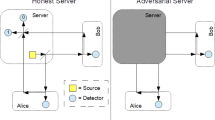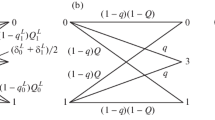Abstract
Practical communication settings for quantum key distribution (QKD) are very complex, and the number of participants should be tunable. Given these, we propose a tunable multi-party high-capacity QKD protocol based on m-generalized Fibonacci sequences and golden coding, where the number of participants can be adjusted adaptively by joining a new participant and revoking an old participant, combining two participant groups into one group. Meanwhile, we construct golden coding to achieve higher capability and fewer interactive communications.


Similar content being viewed by others
Explore related subjects
Discover the latest articles, news and stories from top researchers in related subjects.References
Goldenberg, L., Vaidman, L.: Counterfactual quantum key distribution without polarization encoding. Phys. Rev. Lett. 75, 1239–41 (1995)
Ekert, A.K.: Quantum cryptography based on Bell’s theorem. Phys. Rev. Lett. 67, 661–663 (1991)
Long, G.L., Liu, X.S.: Theoretically efficient high-capacity quantum-key distribution scheme. Phys. Rev. A. 65, 032302–032305 (2002)
Panduranga Rao, M.V., Jakobi, M.: Towards communication-efficient quantum oblivious key distribution. Phys. Rev. A. 87, 012331 (2013)
Li, X.H., Deng, F.G., Zhou, H.Y.: Efficient quantum key distribution over a collective noise channel. Phys. Rev. A. 78, 022321 (2008)
Tanaka, A., Maeda, W., Takahashi, S., Tajima, A., Tomita, A.: Ensuring quality of shared keys through quantum key distribution for practical application. IEEE J. Sel. Top. Quantum Electron. 15, 1622–1629 (2009)
Bennett, C.H., Brassard, G.: Quantum cryptography: public-key distribution and coin tossing. In: Proceedings of IEEE International Conference on Computers, Systems and Signal Processing (Bangalore, India) (New York: IEEE), pp. 175–179 (1984)
Simon, D.S., Lawrence, N., Trevino, J., DalNegro, L., Sergienko, A.V.: High-capacity quantum Fibonacci coding for key distribution. Phys. Rev. A. 87, 032312 (2013)
Barreiro, J.T., Kwiat, P.G.: Hyperentanglement for advanced quantum communication. In: Proceedings- SPIE The International Society For Optical Engineering; 7092P (2008); 6th Quantum Communications and Quantum Imaging Conference
Mafu, M., Dudley, A., Goyal, S., Giovannini, D., McLaren, M., Padgett, M.J.: Higher-dimensional orbital-angular-momentum-based quantum key distribution with mutually unbiased bases. Phys. Rev. A 88, 032305 (2013)
Boyd, R.W., et al.: Quantum key distribution in a high-dimensional state space: exploiting the transverse degree of freedom of the photon. In: Proceedings of SPIE 7948, Advances in Photonics of Quantum Computing, Memory, and Communication IV, 79480L (February 11, 2011). https://doi.org/10.1117/12.873491.
Lai, H., Luo, M.X., Zhan, C., Pieprzyk, J., Orgun, M.A.: An improved coding method of quantum key distribution protocols based on Fibonacci-valued OAM entangled states. Phys. Lett. A. 381, 2922–2926 (2017)
Simon, D.S., Sergienko, A.V.: High capacity quantum key distribution via hyperentangled degrees of freedom. New J. Phys. 16(6), 063052 (2013)
Yu, N.: Light propagation with phase discontinuities: generalized laws of reflection and refraction. Science 334, 333–337 (2011)
Dal Negro, L., Lawrence, N., Trevino, J.: Analytical light scattering and orbital angular momentum spectra of arbitrary Vogel spirals. Opt. Express 20(16), 18209–18223 (2012)
Simon, D.S., Fitzpatrick, C.A., Sergienko, A.V.: Security in the multi-dimensional Fibonacci protocol. arXiv:1503.04448 (2015)
Fraenkel, A.S., Klein, S.T.: Robust universal complete codes for transmission and compression. Discrete Appl. Math. 64, 31–55 (1996)
Lai, H., Zhang, J., Luo, M.X., Pan, L., Pieprzyk, J., Xiao, F.Y., Orgun, M.A.: Hybrid threshold adaptable quantum secret sharing scheme with reverse Huffman-Fibonacci-tree coding. Sci. Rep. 6, 31350 (2016)
Acknowledgements
Hong Lai was supported by the National Natural Science Foundation of China (No. 61702427) and the Doctoral Program of Higher Education (No. SWU115091), the Fundamental Research Funds for the Central Universities (XDJK2018C048), and the financial support in part by the 1000-Plan of Chongqing by Southwest University (No. SWU116007). Mingxing Luo was supported by the National Natural Science Foundation of China (No. 61772437) and Sichuan Youth Science and Technique Foundation (No. 2017JQ0048). Josef Pieprzyk was supported by National Science Centre, Poland, Project Registration No. UMO-2014/15/B/ST6/05130. Cheng Zhan was supported by the National Natural Science Foundation of China (No. 61702426).
Author information
Authors and Affiliations
Corresponding author
Rights and permissions
About this article
Cite this article
Lai, H., Luo, M., Orgun, M.A. et al. Tunable multi-party high-capacity quantum key distribution based on m-generalized Fibonacci sequences using golden coding. Quantum Inf Process 17, 246 (2018). https://doi.org/10.1007/s11128-018-2018-3
Received:
Accepted:
Published:
DOI: https://doi.org/10.1007/s11128-018-2018-3




